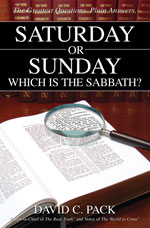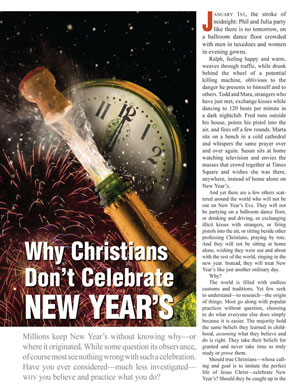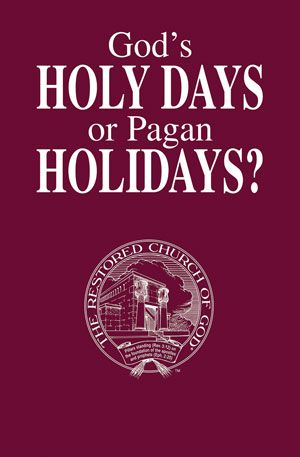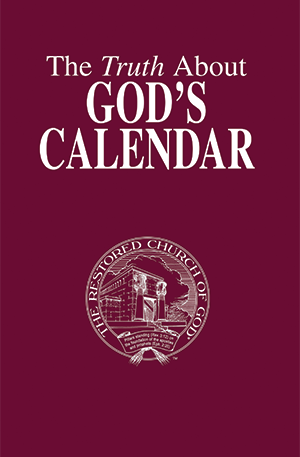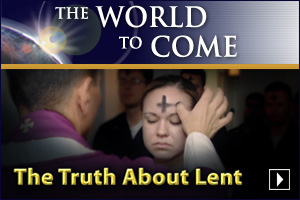January 1st, the stroke of midnight: Phil and Julia party like there is no tomorrow, on a ballroom dance floor crowded with men in tuxedoes and women in evening gowns.
Ralph, feeling happy and warm, weaves through traffic, while drunk behind the wheel of a potential killing machine, oblivious to the danger he presents to himself and to others. Todd and Mara, strangers who have just met, exchange kisses while dancing to 120 beats per minute in a dark nightclub. Fred runs outside his house, points his pistol into the air, and fires off a few rounds. Marta sits on a bench in a cold cathedral and whispers the same prayer over and over again. Susan sits at home watching television and envies the masses that crowd together at Times Square and wishes she was there, anywhere, instead of home alone on New Year’s.
And yet there are a few others scattered around the world who will not be out on New Year’s Eve. They will not be partying on a ballroom dance floor, or drinking and driving, or exchanging illicit kisses with strangers, or firing pistols into the air, or sitting beside other professing Christians, praying by rote. And they will not be sitting at home alone, wishing they were out and about with the rest of the world, ringing in the new year. Instead, they will treat New Year’s like just another ordinary day.
Why?
The world is filled with endless customs and traditions. Yet few seek to understand—to research—the origin of things. Most go along with popular practices without question, choosing to do what everyone else does simply because it is easier. The majority hold the same beliefs they learned in childhood, assuming what they believe and do is right. They take their beliefs for granted and never take time to truly study or prove them.
Should true Christians—whose calling and goal is to imitate the perfect life of Jesus Christ—celebrate New Year’s? Should they be caught up in the excitement? What could be wrong with “ringing out the old and ringing in the new”? What is the origin of this holiday? What does God say about it? You will be surprised to learn the truth that ministers of professing Christianity either do not know—or will not teach.
A Brief History of New Year’s
Before looking at what the Bible says about New Year’s, we must first examine the history of this popular holiday. Notice this from the Encyclopaedia Britannica: “The earliest-known record of a New Year festival dates from about 2000 BC in Mesopotamia, where in Babylonia the New Year (Akitu) began with the new moon after the spring equinox (mid March) and in Assyria with the new moon nearest the autumn equinox (mid September).”
Now notice this: “Among ancient peoples the beginning of the year was determined by one of various events, such as the spring or autumnal equinox or the winter or summer solstice. In Egypt, for example, beginning about 2773 BC, the year began with the heliacal rising of Sirius, which coincided with the start of the flood period of the Nile and came not long after the summer solstice” (Encyclopedia Americana). The Ancient Egyptians, Phoenicians and Persians began their new year with the autumn equinox (September 21), while the Greeks, until the 5th century BC, observed their new year with the winter solstice (December 21).
World Book states, “Many ancient peoples…performed rituals to do away with the past and purify themselves for the new year. For example, some people put out the fires they were using and started new ones.” The Celts celebrated the new year on November 1, marking the end of summer and the harvest, and the beginning of the cold, dark winter ahead. (This was a precursor to Halloween.) They built “sacred” bonfires to scare off evil spirits and to honor their sun god.
Also notice this: “In early times, the ancient Romans gave each other New Year’s gifts of branches from sacred trees. In later years, they gave gold-covered nuts or coins imprinted with pictures of Janus, the god of gates, doors, and beginnings. January was named after Janus, who had two faces—one looking forward and the other looking backward” (ibid.).
Here is more from the Encyclopaedia Britannica: “By the Roman republican calendar, the year began on March 1; after 153 BC the official date was January 1, and this was confirmed by the Julian calendar (46 BC)…In early medieval times most of Christian Europe regarded March 25 (Annunciation Day) as the beginning of the year, though for Anglo-Saxon England New Year’s Day was Dec. 25.”
Since Roman Catholic leaders falsely believed that Jesus Christ was born December 25 (to learn more, read our booklet The True Origin of Christmas), they assumed His mother Mary conceived Him on March 25, nine months before: “March 25th is called the Annunciation of the Blessed Virgin Mary…It celebrates the occasion when the Archangel Gabriel appeared to the young Jewish maiden and announced to her that she was to be the mother of Jesus…Although the Church began very early to commemorate this event, the date itself cannot have been fixed before the date of Christmas was established, which was sometime late in the fourth century. The two dates are dependent on each other, because they must normally have been nine months apart…Then, reaching all the way back, people decided that this was not only the day on which Christ’s earthly life began—it was the day everything began, the day of Creation itself. From here it was a very short step—an almost unavoidable one—to the idea that March 25th must be the beginning of the year, and from the twelfth century until the calendar reform in 1752, March 25th was New Year’s day” (Days and Customs of All Faiths, Howard V. Harper).
These historical accounts make clear that the history of New Year’s Eve and New Year’s Day is deeply rooted in pagan traditions. It originated in the minds of men—pagan idol-worshippers—and it slowly developed over the centuries.
God Hates All Pagan Customs and Traditions—Including New Year’s
Notice what God thinks of New Year’s, and any holiday that has its roots in pagan practices, customs and traditions. You will be shocked.
Let’s begin with Jeremiah 10:2-3: “Learn not the way of the heathen…for the customs of the people are vain.” This is a plain command from God—in your Bible. Throughout His Word, God describes “the heathen” as those who worship nature (the sun, moon, stars, trees, etc.), or manmade idols, or anything but the one true God. He calls such people and their practices heathen. Men call them pagan. Christians understand that God hates all customs, practices and traditions that have pagan roots.
How serious is God about paganism? Follow the next few passages carefully. When He rescued the 12 tribes of Israel from Egypt and led them out of brutal slavery, God commanded, “After the doings of the land of Egypt, where in you dwelt, you shall not do: and after the doings of the land of Canaan, where I bring you, shall you not do: neither shall you walk in [men’s] ordinances” (Lev. 18:3). God told the Israelites not to defile themselves with the practices and customs of the surrounding nations (vs. 24-29). “Therefore shall you keep My ordinance, that you commit not any one of these abominable customs, which were committed before you, and that you defile not yourselves therein: I am the Lord your God” (vs. 30).
God cursed Egypt with 10 plagues and freed Israel from slavery. He parted the Red Sea and led them to safety. He fed them manna from heaven, protected them from battle-tested Gentile armies, delivered them into the Promised Land, and drove out their enemies. How did Israel treat God in turn? “Our fathers understood not Your wonders in Egypt; they remembered not the multitude of Your mercies; but provoked Him…at the Red Sea…They soon forgot His works; they waited not for His counsel: but lusted exceedingly in the wilderness, and tempted God in the desert…They made a calf in Horeb, and worshiped the molten image. Thus they changed their glory [the true God] into the similitude of an ox that eats grass. They forgot God their Savior, which had done great things in Egypt; wondrous works in the land of Ham, and terrible things by the Red Sea…they despised the pleasant land, they believed not His word: but murmured in their tents, and hearkened not unto the voice of the Lord … They joined themselves also unto Baal-peor, and ate the sacrifices of the dead. Thus they provoked Him to anger with their inventions” (Psa. 106:7, 13-14, 19-22, 24-25, 28-29).
God had explicitly commanded Israel to cast out and utterly destroy all nations that occupied the Promised Land (of Canaan). Above all, they were not to make political alliances with them or marry into their families (Deut. 7:1-3, 5, 16). Why? “For they will turn away your sons from following Me, that they may serve other gods” (vs. 4).
But the Israelites—who thought they knew better than God—decided to do things their own way. The picture is awful: “They did not destroy the nations, concerning whom the Lord commanded them: but were mingled among the heathen, and learned their works: and they served their idols: which were a snare unto them. Yes, they sacrificed their sons and their daughters unto devils [demons]. And shed innocent blood, even the blood of their sons and of their daughters, whom they sacrificed unto the idols of Canaan: and the land was polluted with blood. Thus they were defiled with their own works, and went a whoring with their own inventions” (Psa. 106:34-39).
To wake Israel up and get her back on track to being the model nation He had always intended, God gave Israel over to their enemies. Israel repented. God rescued them. Then Israel pursued other gods again. God punished them again. Israel repented again. So went the deliverance-idolatry-punishment-repentance cycle (vs. 40-46), until finally, God had no other choice but to “divorce” unfaithful Israel (Jer. 3:6-11). He used the Assyrians to invade, conquer, relocate and enslave the northern kingdom of Israel (II Kings 17), which “disappeared” into history, having forgotten their true national identity. (Even today, the modern descendants of those 10 “lost” tribes do not understand who they are). Later, God sent the southern kingdom of Judah into Babylonian exile (II Kings 24 and 25). (To learn more, read our book America and Britain in Prophecy. It offers a tremendous amount of proof explaining who these tribes are, where they have been through history—and why this is so important for you to understand.)
Captivity came because Israel lusted after pagan customs, rituals, traditions and ways. After examining the previous scriptures, it becomes obvious that God does not take pagan practices lightly.
God Is NOT the Author of Confusion
True Christians know that “God is not the author of confusion but of peace” (I Cor. 14:33). The Greek word used here for “confusion” also means instability, disorder, commotion, tumult—words that aptly describe New Year’s chaotic history. For thousands of years, men kept changing their New Year from spring to fall, from March 1 to January 1 (and in some cases, December 25), to March 25, back to January 1 again—the dead of winter!
Notice Merriam-Webster’s Encyclo-pedia of World Religions: “January 1 was restored as New Year’s Day by the Gregorian calendar (1582), immediately adopted by Roman Catholic countries. Other countries slowly followed suit: Scotland, 1660; Germany and Denmark, about 1700; England, 1752; Sweden, 1753; and Russia, 1918.”
Even today, men cannot agree on the date. Notice: “Chinese New Year is celebrated officially for a month beginning in late January or early February,” and “The Muslim New Year falls on the first day of the month of Muharram and commemorates the date of the Hegira (July 16, 622 A.D., on the Gregorian calendar), the starting point of the Muslim calendar. Since the Muslim year is a lunar one consisting of only 354 days, the commencement of the new year fluctuates widely by the Western calendar” (Encyclopedia Americana). The Vietnamese New Year, Tet, falls sometime between January 21 and February 20. And, “…the Jewish New Year…is observed during September or early October. Hindus in different parts of India celebrate the new year on various dates” (World Book).
This is what happens when people insist on following their own judgment rather than trusting the One who designed the entire universe and everything in it.
Not only is the history of New Year’s confusing and chaotic, but so is the holiday itself. During New Year’s celebrations, people let go of all inhibition—and many times self-respect—and simply go wild. They use drugs, overdrink, practice free sex—and usually with those they barely know. These sudden actions often yield life-long repercussions. They shoot guns off into the air to “ring in the new year.” Common sense is thrown away in order to have a good time. The only thing people regret are next-day hangovers.
In 2007, the U.S. National Highway Traffic Safety Administration released a report revealing that the number of deaths as a result of alcohol-impaired drivers greatly increases between the Christmas and New Year’s holidays. The average number of drunk driving deaths between 2001 and 2005 was 36 a day. This number grows 50 percent during Christmas and New Year’s!
Notice also: “On average from 2001 to 2005 (the last year for which complete data is available), about 40 percent of all fatalities during the Christmas and New Year holiday periods have occurred in crashes where at least one of the involved drivers was alcohol-impaired…” (ibid.).
Another source added, “38 percent of all traffic fatalities during the Christmas period occurred in crashes involving a drunk driver or motorcycle rider and 41 percent during the New Year’s period…This compares with 31 percent for the year as a whole” (“New Data Shows Drunk Driving Deaths Spike During Holidays,” Occupational Health and Safety magazine).
World Book (2010) records that when America was still in its infancy, “Many American colonists in New England celebrated the new year by firing guns into the air and shouting.” Sadly, this tradition still exists in parts of the United States. Few think about how their actions, combined with gravity, can have a deadly effect. What goes up (bullets) must come down somewhere. A recent example of this was New Year’s Eve of January 2010, when the Daily Mail of Britain reported that a four-year-old boy was suddenly killed by a bullet while sitting with his parents at a church service. The wound was gaping. Experts believe the shot, which came through the roof of the church, was fired from an AK-47 assault rifle more than two miles away! On New Year’s Eve in 2005, two people were struck in different parts of downtown Atlanta by stray bullets. One hit a woman in the head. In Puerto Rico, it is said that so many guns are fired on New Year’s that it can sound like a warzone.
Obviously, a holiday this chaotic, violent and dangerous does not reflect God’s command to “Let all things be done decently and in order” (I Cor. 14:40). Again, Christians recognize this about New Year’s celebrations—and avoid them.
True Christians Live by God’s Word—Not by “Traditions of Men”
Christians know that they must live “by every word that proceeds out of the mouth of God” (Matt. 4:4). They also realize that man cannot rely on himself to determine good from evil because “the heart is deceitful above all things, and desperately wicked” (Jer. 17:9), and also “the way of man is not in himself; it is not in man who walks to direct his steps” (10:23). God states, “My thoughts are not your thoughts, neither are your ways My ways…as the heavens are higher than the earth, so are My ways higher than your ways, and My thoughts than your thoughts” (Isa. 55:8-9). The Creator designed us and gave us life. He knows how we are supposed to live.
God has given His creation an instruction manual to help men live the way He originally intended (John 10:10). That “manual”—the Holy Bible—is God’s Word and His truth (John 17:17). It is filled with spiritual laws, statutes, and judgments guided by perfect spiritual knowledge, wisdom and understanding. II Timothy 3:16-17 states, “All scripture is given by inspiration of God, and is profitable for doctrine [teaching], for reproof, for correction, for instruction in righteousness: that the man of God may be perfect, thoroughly furnished unto all good works.” Only God’s Word can accurately distinguish right from wrong, righteousness (obedience to God’s commandments—Psalm 119:172) from sin (breaking God’s spiritual laws—I John 3:4 and Romans 7:17).
God’s people understand that, as the only real standard of truth man can live by, “Scripture cannot be broken” (John 10:35).
But most people—including most thought-to-be Christians—love and follow the ideas of men. Jesus knew this, and warned, “This people honors Me with their lips, but their heart is far from Me. Howbeit in vain do they worship Me, teaching for doctrines the commandments of men. For laying aside the commandment of God, you hold the tradition of men…Full well you reject the commandment of God, that you may keep your own tradition…making the word of God of none effect through your tradition” (Mark 7:6-9, 13).
God commands His people not to follow pagan practices.
Are there any biblical examples of God’s servants celebrating New Year’s? What about David—called a man after God’s own heart? What about Abraham—the father of the faithful? What about Moses, or even Jesus Christ?
The answer to each is no. Nor is there any biblical instruction to celebrate this day. But that does not stop almost all professing Christians from doing so. Society—including millions who claim to follow Christ—ignores God, in effect telling Him, “We will decide what we should or should not do!” God’s people actively search the Bible to learn His will. Their life’s mission is to live by God’s Word alone—not by the traditions of men, including all pagan celebrations.
People can worship in ways that represent things far different from what they sincerely believe or intend. When they have observed a practice for a long time they come to identify with it, as though it were their own. They become vested in it. When one tries to tell them the truth—even presenting facts, evidence and proof—and in the case of Bible truths, Scripture—many become hostile—outright angry!—that any would dare speak against sacred personal beliefs.
The proof is overwhelming that popular holidays are “traditions and commands of men”—condemned by God!
Vast millions keep them, anyway!
In another passage, God makes absolutely clear that He does not want His people mixing His ways with any false ways. Let’s read it: “What thing soever I command you, observe to do it: you shall not add thereto, nor diminish from it” (Deut. 12:32). In other words, do exactly what God says—not more, nor less!
God Has His OWN Calendar, With Its Own “New Year”
When God instituted the Passover to Israel, He also revealed to them His sacred calendar: “This month shall be unto you the beginning of months: it shall be the first month of the year to you” (Ex. 12:2). God’s calendar begins in the spring, between March and April of this world’s calendar system. Leviticus 23 reveals all the special Holy Days (annual sabbaths) that Christians are to observe. They are dictated by GOD’S calendar, not man’s. (To learn more, read our booklet The Truth About God’s Calendar.) Although the Bible tells us when His calendar year begins, God does not command—or suggest—or even allow—that His followers ever throw aside self-control for a night of partying.
His people understand the days they are commanded to observe: Passover and the seven Days of Unleavened Bread (in the early spring)—the Feast of Pentecost (or Firstfruits, in the late spring)—the Feast of Trumpets (or Rosh Ha-Shanah)—as well as the Day of Atonement (or Yom Kippur), the Feast of Tabernacles (Sukkot), and the Last Great Day (all in the early fall). God carefully explains when these days are to be observed within His sacred calendar. Jesus kept them, as did the apostles and the New Testament Church (Matt. 26:17-19, 26-28; 28:18-20; I Cor. 5:6-8). The true Church—the only one Jesus established—has kept them for 2,000 years, since AD 31.
Most who claim to be Christian believe these special annual sabbaths are only for the Jews. They prefer pagan holidays, instituted in humanly-devised calendars. True Christians know better.
This Is Satan’s World—True Christians Must Come Out of It
God’s true servants realize that this world belongs to Satan. He rules it through mass deception in the name of Jesus Christ. Here are two passages you should never forget: “The great dragon...that old serpent, called the Devil, and Satan...which deceives the whole world” (Rev. 12:9), and “The god of this world has blinded the minds of them which believe not” (II Cor. 4:4). In Genesis 3, Satan misled Adam and Eve into eating from the forbidden tree, thus cutting off their offspring—mankind through the ages—from God. And Satan is the same evil spirit who misleads man into committing every sin under the sun.
As long as the devil influences the nations of the world, prior to the now imminent Return of Jesus Christ, mankind will continue drowning in sin—including heathen customs and practices, which may seem harmless to the average person, but in fact insult God and are a stench in His nostrils.
This Satan-influenced world is about to collapse. Speaking of the great religious and political system that has deceived the entire world, God declares, “Babylon the great is fallen, is fallen, and is become the habitation of devils [demons], and the hold of every foul spirit, and a cage of every unclean and hateful bird. For all nations have drunk of the wine of the wrath of her fornication, and the kings of the earth have committed fornication with her, and the merchants of the earth are waxed rich through the abundance of her delicacies” (Rev. 18:2-3). Make this passage personal! Determine to learn and understand who it is that God is speaking of here. (Our booklet Who or What Is the Beast of Revelation? will leave you in shock about what you did not know.)
Speaking of Babylon in context, God commands all of His people to “Come out of her [the ways of the world]…that you be not partakers of her sins, and that you receive not of her plagues” (vs. 4). Jesus told His disciples, “You are not of the world, but I have chosen you out of the world...” Though they must live in it, Jesus’ disciples today are not—and cannot be—of this world!
New Year’s Eve and New Year’s Day originate from this pagan, Satan-influenced world. They, with many other pagan holidays, were designed to deceive mankind as a whole by appealing to fleshly, carnal desires—or, what the Bible calls the works of the flesh: “The works of the flesh are manifest [the Greek means “obvious”], which are these: adultery, fornication, uncleanness, lasciviousness, idolatry, witchcraft, hatred, variance, emulations, wrath, strife, seditions, heresies, envyings, murders, drunkenness, revelings, and such like” (Gal. 5:19-21).
To any honest person, much of this list sounds like a description of New Year’s.
The last part of verse 21 in Galatians declares, “They which do such things shall not inherit the kingdom of God.” Those truly serving God have their minds focused on God’s kingdom (Matt. 6:33)—not the fleshly cravings of this world. They strive to “put off the old man” (Col. 3:9), and actively imitate the perfect, righteous example of Christ. They are to dedicate themselves to God and His way of life. They allow God’s Word to direct and guide every thought and action. They understand that they come out of the world—I repeat, including its pagan customs, practices and traditions. New Year’s is no exception.
To learn more about what God says regarding His Holy Days and men’s holidays, read our booklet God’s Holy Days or Pagan Holidays? Again, for a more thorough look at Christmas, read The True Origin of Christmas. To learn the truth about Easter, read The True Origin of Easter. You will be shocked at the origin of these celebrations, and the large number of clear scriptures that explain God’s view of these traditions.
Soon, Satan will be removed from his throne, and replaced by Jesus Christ, who will establish God’s government—the way of righteousness, peace, mercy and truth—on Earth. When that day arrives, mankind will no longer be deceived into practicing customs contrary to God’s will.
You now know the plain truth about New Year’s, its pagan origins, its chaotic history, and how God views its customs, traditions and practices!

